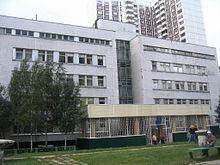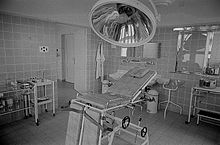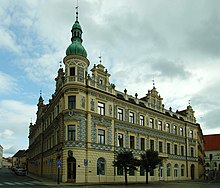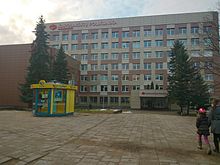Polyclinic


Polyclinic (from the Greek πόλι-ς / póli-s / 'city' and clinic ) literally means city hospital . The term has at least three different meanings and describes:
- a hospital or clinic for the outpatient examination and treatment of patients.
- a single hospital department that only offers outpatient examinations and treatment ("hospital outpatient clinic")
- a summary of various resident doctors in a large practice (outpatient clinic)
history
Originally a clinic was a hospital mainly used to educate medical students. Therefore, mainly patients whose illness was interesting for this training were accepted. The polyclinic was the part of the clinic to which the citizens of the university town ( polis ) were admitted , no matter how interesting their "case" was.
Polyclinic was also understood to mean the grouping together of various specialists in a “large practice” ( medical center ) connected to a hospital or clinic. Such polyclinics are in Austria, Denmark, Switzerland, the Netherlands (and sometimes in Germany) outpatient clinic called.
In the GDR , polyclinics were independent state outpatient clinics with at least four different medical specialties. With the exception of a few university outpatient clinics, they were not connected to hospitals and were the predominant organizational form of outpatient medical treatment in the GDR. In structural terms, the polyclinics often had clinic-like structures, but were mostly not connected to a hospital. Smaller or specialized facilities (partly also in companies) were called outpatient clinics , rural outpatient departments or rural outpatient departments .
After reunification , their closure in favor of individual practices of resident physicians was initially prescribed by law, but in some cases the specialists also stayed in the old buildings, so that in some places there are now several organizationally separate medical practices under one roof. These facilities are usually called “medical centers”.
State polyclinics not tied to hospitals currently exist mainly in Russia , Ukraine and most other formerly socialist countries.
Polyclinics in the current health discussion
The current health discussion uses the term “polyclinic” in memory of the institutions of the GDR for the concept of interdisciplinary practices, in which mostly employed doctors from different specialties are responsible for outpatient care.
Polyclinics in the narrower sense existed and existed in the Federal Republic as facilities of university clinics for the purpose of scientific research and training. Besides are practice clinics , medical care centers , and various forms of outpatient clinics in hospitals possible.
Arguments for Polyclinics
Expensive equipment (e.g. X-ray machines ) and rooms (e.g. operating theater) and sometimes staff are shared, administration is central and the doctors employed receive a fixed salary. As a result, lower costs are expected for the health insurance companies, which therefore often advocate the establishment of polyclinics or similar models (medical care centers, see below) politically. With further treatment and referrals within the polyclinic, patients have no loss of time and no long walking or driving distances. Doctors' fixed salaries reduce the incentive for doctors to select treatments based on profit maximization rather than medical treatment.
Arguments against polyclinics
Polyclinics can only be set up in central locations. Many patients therefore have to travel long distances, the travel costs of which do not appear in any health statistics and are nevertheless considerable. Because of their size, the polyclinics require full-time administration. Decoupling the salaries of employed doctors from sales can reduce the motivation to overtime and innovate. There can also be long waiting times for patients.
Medical care centers
The GKV Modernization Act (GMG) of 2004 stipulates that doctors licensed to provide medical care and other service providers in the health care system can join forces to form so-called medical care centers . A medical care center is an interdisciplinary, medically managed facility (like a polyclinic in the GDR) in which statutory and privately insured patients can be treated.
In contrast to the polyclinics of the GDR, medical care centers are often companies under civil law with the personal liability of the leading doctors and are voluntarily founded on the initiative of the service providers involved. With the GKV supply structure law (GKV-VStG) it was regulated in 2012 that MVZs may only be founded by partnerships, registered cooperatives (eG) and companies with limited liability (GmbH). Stock corporations (AG) are not allowed. They are similar multidisciplinary group practices the old style with the new feature that non-medical care provider partner may be, and the provision is relieved of services by employees against group practices. This also takes into account the fact that there has been a development towards clinic-like group practices, so-called practice clinics, for a long time and, on the other hand, there has been a tendency to set up practices in hospitals for a long time, especially if the owners were already working as attending doctors in hospitals.
Mobile polyclinic
A special form of polyclinic in South Africa is the Phelophepa health train, which offers inexpensive or free care in medically underserved areas. This includes ophthalmological diagnostics and care, treatment of skin diseases, cancer examinations, diabetes prevention and many other services.
Due to the political situation in South Africa, this mobile polyclinic can only be financed through donations (sponsors).
Web links
Individual evidence
- ↑ Duden.de: Keyword Polyclinic
- ↑ Give up the Gocher hospital? - The current health discussion in the Kleve district
- ↑ Gerd Glaeske: Textbook Health Services Research . Ed .: Pfaff, Neugebauer, Glaeske, Schrappe. 2nd Edition. Schattauer, Stuttgart, ISBN 978-3-7945-3236-0 , pp. 284 .



